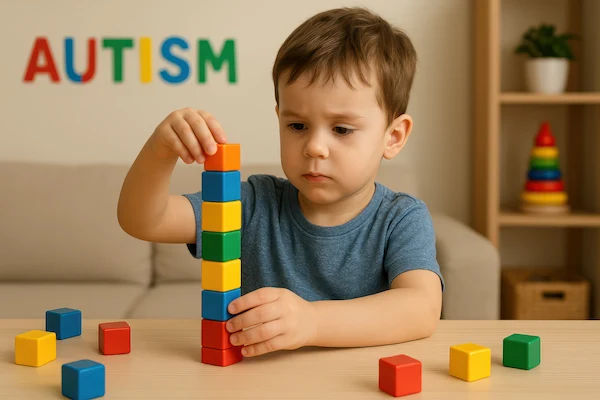Guide to Autism And Social Skills
Explore how autism affects social skills, strategies to improve communication, and practical tips for supporting social development.

Written by Dr. M L Ezhilarasan
Reviewed by Dr. Dhankecha Mayank Dineshbhai MBBS
Last updated on 13th Jan, 2026

Introduction
For many autistic individuals, the social world can feel like navigating a complex, unspoken game where everyone else knows the rules but you. Social interactions that seem intuitive to neurotypical people, like making eye contact, understanding a joke, or knowing when to speak in a conversation, can require conscious effort and learning for someone on the autism spectrum. This difference in social communication style is a core characteristic of autism, but it's crucial to understand it not as a deficit, but as a difference. This guide aims to demystify the relationship between autism and social skills, offering insight, practical strategies, and, most importantly, a perspective of understanding and acceptance for autistic individuals, their families, and the wider community. We will explore the "why" behind these challenges, break down key social skills, and highlight the unique strengths that autistic individuals bring to social interactions.
Understanding the Social Communication Style in Autism
Autism Spectrum Disorder (ASD) is a neurodevelopmental condition, meaning the brain processes information differently. This fundamentally shapes how autistic individuals perceive and engage with the social world. It's not a matter of unwillingness but often a difference in wiring.
It's More Than Just Shyness: The Neurological Basis
Research using brain imaging has shown that autistic individuals may use different neural pathways for social processing. For instance, making eye contact, which typically activates the brain's social reward centers in neurotypical people, can be overwhelming or even painful for someone with autism, triggering anxiety centers instead. This explains why an autistic person might avoid eye contact not out of rudeness, but as a way to manage sensory input and better focus on what is being said. Similarly, the rapid back-and-forth of a conversation, with its subtle tones and implied meanings, can be difficult to process in real-time. Understanding these social communication differences as neurological is the first step toward empathy.
The "Double Empathy Problem": A Two-Way Street
A groundbreaking concept in understanding autism and social skills is the "double empathy problem." Traditionally, the difficulty in social interactions was seen as a one-sided issue, the autistic person failing to understand neurotypical cues. However, this theory posits that the breakdown is mutual. Neurotypical people also struggle to understand the communication style of autistic individuals, who are often more direct, literal, and less focused on hierarchical social rituals. This reframing is powerful; it shifts the responsibility from being solely on the autistic person to adapt and suggests that building bridges of understanding is a two-way process that benefits everyone.
Consult a Developmental Paediatrician for the best advice
Key Social Skills and Common Challenges
Social skills are a complex set of abilities we use to interact with each other. Let's break down some key areas where autistic individuals might experience challenges.
Reading Non-Verbal Cues: The Unspoken Language
A significant part of communication is non-verbal. This includes facial expressions, body posture, gestures, and tone of voice. An autistic person might have difficulty interpreting a sarcastic tone or understanding that crossed arms could signal boredom. They may also express their own emotions through non-typical non-verbal communication, which can be misinterpreted by others. For example, hand-flapping (stimming) is often an expression of joy or excitement, not distress.
The Art of Conversation: Initiating, Maintaining, and Ending
Conversation is a dance with unwritten rules. Challenges here can include knowing how to start a conversation, taking turns appropriately without interrupting, staying on topic, and knowing how to end an interaction smoothly. An autistic individual might monologue about a special interest, not realising the other person is disengaged, or they may struggle with the open-ended nature of "small talk," preferring concrete, factual discussions. Learning these conversation skills for autistic teenagers and adults is often a key focus of therapy.
Building and Maintaining Friendships
Friendships require a deep understanding of social nuances: reciprocity, emotional support, sharing interests, and navigating conflicts. The process of autism and making friends can be daunting. An autistic person might desire friendship deeply but struggle with the unspoken rules of how to initiate a playdate, how to be a "good friend," or how to handle the unpredictable nature of peer relationships. They may benefit from explicit teaching about these concepts.
Practical Strategies for Developing Social Skills
Supporting social skill development is not about forcing conformity but about providing tools for successful and fulfilling interactions.
For Parents and Caregivers: Creating a Supportive Environment
• Use Social Stories: These are short, descriptive stories that explain social situations and expected behaviors in a clear, literal way.
• Practice Through Play: Role-play different scenarios, like ordering food or dealing with a disagreement.
• Video Modelling: Watch videos of social interactions and pause to discuss what is happening.
• Be a "Social Interpreter:" Gently and non-judgmentally explain why people might be acting a certain way. ("When Sarah frowned, it was because she was confused by your question, not angry at you.")
For Autistic Individuals: Self-Advocacy and Finding Your Tribe
• Learn to Script: Prepare phrases for common situations. ("I need a moment to think," or "I find it easier to listen without eye contact.")
• Identify Your Social Battery: Recognise when you need a break from socialising to recharge.
• Find Shared-Interest Groups: Connecting with people who share your passion whether it's coding, trains, or art can make socialising feel more natural and less pressured. This is a powerful way of finding your tribe.
Professional Support and Therapies That Can Help
If social challenges are causing significant distress, seeking professional guidance can be beneficial. If you are concerned about your or your child's social development, consulting a specialist through Apollo24|7 can provide a clear path forward.
Social Skills Groups: Learning in a Safe Space
These therapist-led groups provide a structured, safe environment to practice skills like conversation, cooperation, and problem-solving with peers facing similar challenges. This is often considered one of the best therapies for autism social skills as it offers real-time practice and feedback.
Speech-Language Therapy and Applied Behavior Analysis (ABA)
Speech-Language Therapy: Focuses on "pragmatic language," the social use of language, including understanding idioms, staying on topic, and using appropriate tone.
Applied Behavior Analysis (ABA): Uses principles of learning to teach new skills and reduce behaviors that interfere with social functioning. Modern, ethical ABA is play-based and child-led.
Celebrating Neurodiversity: The Unique Social Strengths of Autism
While challenges are real, it's vital to recognise the unique social strengths associated with autism. Autistic individuals are often:
• Genuine and Honest: They are typically less motivated by social status and more likely to be direct and truthful.
• Loyal and Committed Friends: Once a friendship is established, they can be incredibly loyal, reliable, and non-judgmental.
• Passionate Conversationalists: Their deep knowledge of special interests can lead to fascinating and insightful conversations.
• Strong Sense of Justice: They often have a powerful moral compass and a low tolerance for unfairness or hypocrisy.
Embracing neurodiversity means valuing these differences as a natural part of human variation.
Conclusion
Understanding the intricate relationship between autism and social skills is a journey of empathy and reframing. It requires moving away from a deficit-based view and toward an appreciation of neurodiversity. For autistic individuals, learning social norms can be a valuable skill set for navigating the world, but it should never come at the cost of their authentic selves. For families, educators, and society, the goal is to build bridges of understanding to learn the communication style of autistic individuals as they learn ours. By creating inclusive environments, using supportive strategies, and celebrating unique strengths, we can ensure that everyone has the opportunity to form meaningful connections. Remember, the goal is not to "fix" but to empower. If social challenges are impacting quality of life, consider booking an online consultation with a developmental specialist on Apollo24|7 to explore personalised support options.
Consult a Developmental Paediatrician for the best advice
Consult a Developmental Paediatrician for the best advice

Dr Yaja Jebaying
Paediatric Gastroenterologist
9 Years • MBBS, MD PEDIATRICS, FELLOWSHIP PEDIATRIC GASTROENTEROLOGY AND HEPATOLOGY AND LIVER TRANSPLANTATION
Delhi
Apollo Hospitals Indraprastha, Delhi
(25+ Patients)

Dr. Deepa Passi
Paediatrician
29 Years • MBBS, MD
Noida
Apollo Hospitals Sector 26, Noida
(50+ Patients)

Dr Indranil Karmakar
Paediatrician
5 Years • MBBS,DNB PAEDIATRICIAN
Kolkata
Dr Indranil Karmakar Clinic, Kolkata
Dr. R K M Pooja
Paediatrician
5 Years • MBBS , MD in Pediatrics
Bengaluru
Apollo Clinic, JP nagar, Bengaluru

Dr. Saurabh Sharma
Paediatrician
15 Years • MBBS, MD Paediatrics
Pune
Blooming Tads, Pune
(75+ Patients)
Consult a Developmental Paediatrician for the best advice

Dr Yaja Jebaying
Paediatric Gastroenterologist
9 Years • MBBS, MD PEDIATRICS, FELLOWSHIP PEDIATRIC GASTROENTEROLOGY AND HEPATOLOGY AND LIVER TRANSPLANTATION
Delhi
Apollo Hospitals Indraprastha, Delhi
(25+ Patients)

Dr. Deepa Passi
Paediatrician
29 Years • MBBS, MD
Noida
Apollo Hospitals Sector 26, Noida
(50+ Patients)

Dr Indranil Karmakar
Paediatrician
5 Years • MBBS,DNB PAEDIATRICIAN
Kolkata
Dr Indranil Karmakar Clinic, Kolkata
Dr. R K M Pooja
Paediatrician
5 Years • MBBS , MD in Pediatrics
Bengaluru
Apollo Clinic, JP nagar, Bengaluru

Dr. Saurabh Sharma
Paediatrician
15 Years • MBBS, MD Paediatrics
Pune
Blooming Tads, Pune
(75+ Patients)
More articles from Autism Spectrum Disorder
Frequently Asked Questions
1. What is the difference between autism and social anxiety?
While both can involve social withdrawal, the root cause is different. Social anxiety is an intense fear of being judged or embarrassed in social situations. In autism, social challenges stem from inherent differences in understanding and processing social information. However, it's common for autistic individuals to develop social anxiety due to repeated negative social experiences.
2. Can social skills be taught to an autistic person?
Yes, social skills can be explicitly taught and improved with support, strategies, and practice. The aim is not to change who they are but to provide them with a 'toolkit' for navigating social situations more comfortably and successfully.
3. Why do some autistic people avoid eye contact?
For many on the spectrum, eye contact can be overstimulating, uncomfortable, or even painful. It can make it harder to concentrate on what is being said. Avoiding eye contact is often a coping mechanism to help them focus better on the conversation.
4. What are some good social skills activities for an autistic child?
Structured activities are best. These include board games (teaching turn-taking), role-playing different scenarios, using Social Stories, and participating in small, supervised playgroups with clear goals and time limits.
5. How can I be a good friend to an autistic person?
Be direct, patient, and non-judgmental. Accept their communication style, such as a preference for factual conversation or less eye contact. Respect their sensory needs and boundaries. Most importantly, value them for their authenticity and unique perspective.
